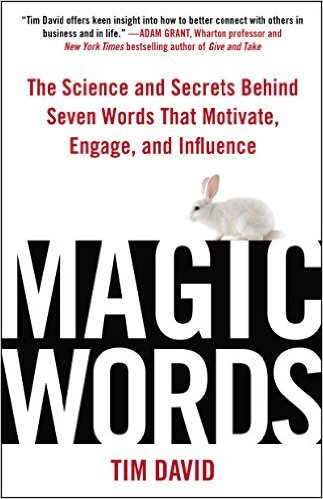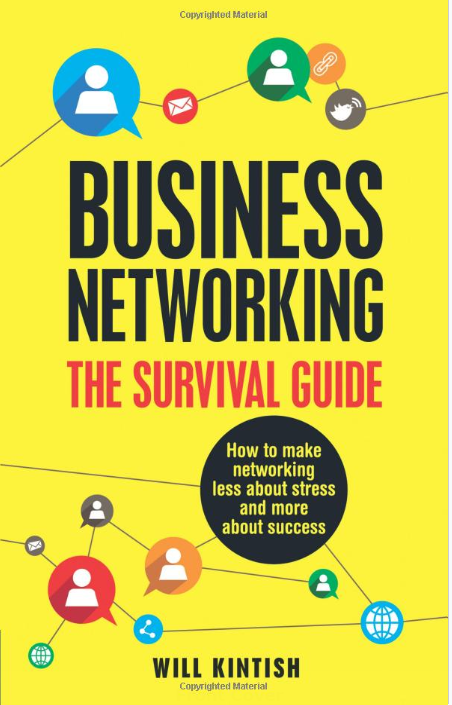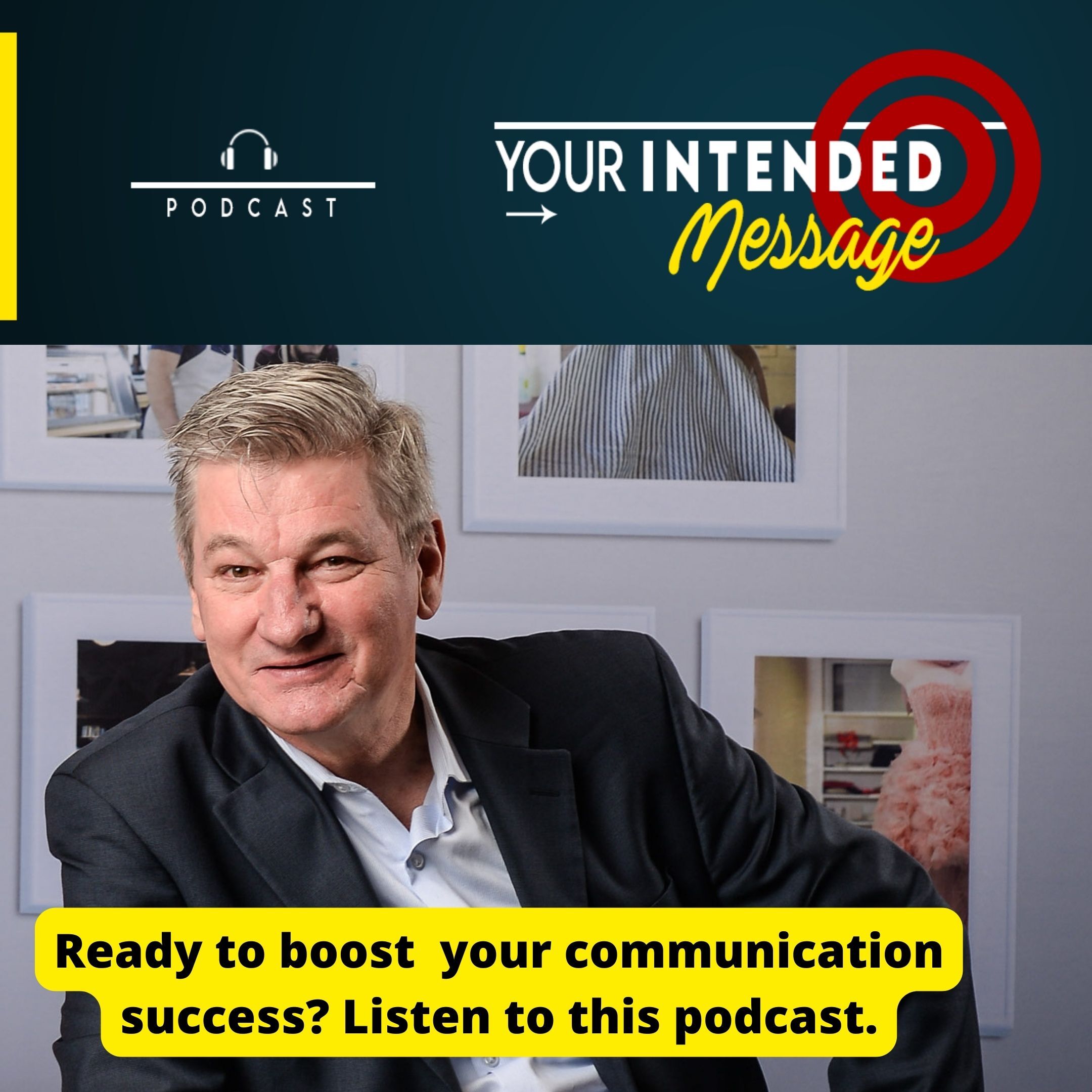
17.5K
Downloads
292
Episodes
The podcast about Effective Communication in Business
Better communication skills will advance your career and business. Are you ready to enhance your understanding and results from better communication? Listen and learn how to deliver Your Intended Message.
Are you willing to cross-examine communication from various perspectives? Would you like to deliver your intended message more effectively?
Listen to Your Intended Message to gain a powerful advantage in your ability to convey your message to your audience, team, clients or marketplace.
Learn from the mistakes and success of communication experts from around the world from different scenarios.
The better communicator has the competitive advantage.
Imagine what that means to you when you improve the success of your next conversation, presentation or message.
Your Host - George Torok
https://yourintendedmessage.com/
The podcast about Effective Communication in Business
Better communication skills will advance your career and business. Are you ready to enhance your understanding and results from better communication? Listen and learn how to deliver Your Intended Message.
Are you willing to cross-examine communication from various perspectives? Would you like to deliver your intended message more effectively?
Listen to Your Intended Message to gain a powerful advantage in your ability to convey your message to your audience, team, clients or marketplace.
Learn from the mistakes and success of communication experts from around the world from different scenarios.
The better communicator has the competitive advantage.
Imagine what that means to you when you improve the success of your next conversation, presentation or message.
Your Host - George Torok
Episodes

Thursday Apr 11, 2024
PowerPoint Success: Ellen Finkelstein
Thursday Apr 11, 2024
Thursday Apr 11, 2024
Make PowerPoint Enhance Your Presentation
Don't be a PowerPoint Fool
Episode 202 (Ellen is based in Iowa)
In this conversation with Ellen Finkelstein we explore:
- Common mistakes to avoid when presenting with PowerPoint
- How to take a more productive approach to your presentation
- How your words, slides and delivery contribute to your success
- Why text on your slides stop people from listening
- How non-designers can create attractive slides
- The importance of practicing your presentation
- Your secret helpers - Text Pane and Presenter View
- Guidelines and tests for effective slide design
- How to fix boring slides
About our Guest Ellen Finkelstein:
She's a PowerPoint MVP and has been one since 2010. That's a Microsoft award and it stands for Most Valuable Professional. There are only 18 in the United States.
Ellen has been training and writing about PowerPoint since before 1999, including several books (written quite a while ago) and her PowerPoint Tip blog.
She isn't a designer so she loves to help non-designers create great PowerPoint slides that communicate clearly, command attention, and help the audience understand and remember the message.
-----
The Techniques that Will Make Designing Your Slides EASY!"
https://www.ellenfinkelstein.com/pptblog/getstarted/
-----
And so that's what how you have to write the content. And I do recommend doing that outside of PowerPoint and it's thinking about what you're saying.
So number two, I'll just go really quickly on the slide poor but everybody knows what death by PowerPoint is there's just lots and lots of text on a slide, slide after slide of text.
There's a fair amount of research that shows that we can't listen and look at the same time. That research is why there are some states that have laws against even being on the phone while you're you're listening to someone and talking to somebody while you're driving.
Okay, because you can't really listen and see at the same time, probably what the person is saying on the phone is a lot more interesting than what's in front of you.
So when you put up a slide with a lot of text, people start to read it, we're more visual, the part of the brain that that takes in visual information is much bigger than the part that takes an auditory information.
People read it, but they can read faster than you could speak. So they read ahead of you, they're not listening. And then when they're finished, they go back to listening to you. And they see that, oh, I've already read that.
So why should I pay attention to the speaker?
-----
That image should help people understand and remember what you are saying.
-----
I mentioned that presenters screen which functions a little bit like a teleprompter, and so the audience doesn't see it, you see your notes that you've put in the Text Pane, but they just see the slides.
-----
Never make text move. So don't make text fly in or fly up.
It's almost always annoying to the audience. Because as the text is flying in, they see it and trying to read it, but it's moving.
It gives people a headache. It's not nice to the audience to do that. So I would say I almost always use either appear or fade, if I'm using it on text, you know, it doesn't move at all.
-----
Read the rest of this entry »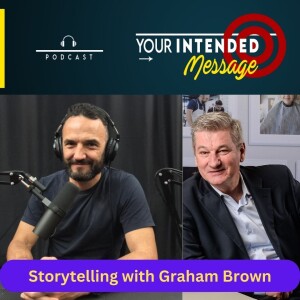
Thursday Apr 04, 2024
Story Telling for Business Leaders: Graham Brown
Thursday Apr 04, 2024
Thursday Apr 04, 2024
How to use Three-Box Storytelling to build Relationships
A simple method to frame and tell your stories
Episode 201 (Repeat of #68)
At the time of this interview, Graham Brown was based in Singapore
Highlights from this conversation about storytelling
The Heart as an Analogy (00:00:00)
An analogy for the heart as a symbol of music, love, and relationships.
Introduction of Graham Brown (00:01:22)
Overview of Graham Brown's background and achievements.
Introduction to Three Box Storytelling Technique (00:02:45)
Explanation of the three-box storytelling technique and its application in business communication and sales presentations.
Three Scenes of a Story (00:04:03)
Explanation of the three scenes in a story using the example of "A Christmas Carol."
Application of Three Box Technique in Sales Presentation (00:06:07)
Demonstration of how a business leader can use the three-box technique in a sales presentation.
Transformation and Crossing the River (00:10:44)
Discussion on the transformation journey in storytelling and the symbolism of crossing the river as a challenge.
Importance of Trust in Storytelling (00:12:22)
The significance of establishing trust through commonality and backstory in storytelling.
Power of Analogies in Communication (00:14:52)
Exploration of analogies as short form stories and their effectiveness in communicating unfamiliar concepts.
Creating Familiar Territory in Communication (00:20:04)
Emphasizing the importance of finding familiar territory in introducing new ideas or technologies.
Behavior Change and Familiarity (00:21:48)
Highlighting the role of familiarity in facilitating behavior change and acceptance of new concepts.
The familiarity part (00:22:56)
Neuropsychological studies show the brain can't distinguish between past, present, and future, making familiarity crucial in storytelling.
Archetypes and plot lines (00:24:42)
Joseph Campbell's hero's journey and the use of existing archetypes and plot lines in storytelling.
Podcast guesting agency (00:27:03)
Graham Brown's agency, Podcast Guesting Pro, helps people get booked on podcasts and navigate the process.
Effective use of stories in sales presentations (00:29:52)
Maya Angelou's advice on making people feel something, using the power of the backstory, and the importance of practice in storytelling.
----
Podcast Guesting Pro is a dedicated Podcast Booking Agency that works with B2B thought leaders. They help you reach new audiences and build your authority by booking you on podcasts to showcase your expertise and spread your message. Learn more here...
https://www.podcastguesting.pro/
-----
Read the rest of this entry »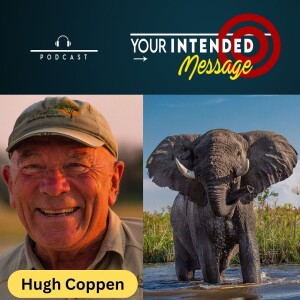
Thursday Mar 28, 2024
Communication Lessons from Nature: Hugh Coppen
Thursday Mar 28, 2024
Thursday Mar 28, 2024
Why is listening a life saving skill in nature
Let's learn communication skills from the elephants
In this enlightening episode, host George Torok chats with leadership consultant and coach, Hugh Coppen.
Episode #200 (Repeat of #57)
When he's not on safari in Zimbabwe, Hugh lives in California.
Coming from a Zimbabwean farm, Coppen has a deep-seated love for wildlife. Now, as a leadership consultant, he channels his passion into valuable lessons for CEOs worldwide. His company, Tasimba, provides immersive safari experiences in Zimbabwe, creating a unique environment for personal and professional growth.
In this discussion, Coppin draws fascinating parallels between wild animal communication (especially elephants) and how we as humans can use similar communication methods. From understanding body language to acknowledging the power of silence, we explore lessons from the wild that can enhance our effectiveness in communication.
We delve deeper into 'listening' - not just to spoken words, but to non-verbal cues and our surrounding environment. Given their lack of speech, wild animals embrace body language and other communication modes that are insightful to us.
Coppen uses practical examples from the animal kingdom, like the positioning of an elephant's head or a flapping of the ears, to underline the importance of body language in effective communication and building listeners’ trust.
This episode, combining adventurous storytelling with critical leadership insights, is a must-listen for professionals looking to enhance their communication skills or anybody interested in learning from nature.
We also look at advanced communication skills in wilderness creatures like Rams and impalas,, especially during their mating seasons. These creatures have evolved complex vocalization methods and an astounding sense of sound, facilitating communication across great distances, safeguarding them from predators.
Another point of discussion is the intricate sub-aural communication method elephant families use. These communications, mostly unheard by humans and predators, help elephants coordinate complicated activities and respect for each other. The example of Cape buffalo herds coming together in large numbers during scarce resources is another humbling lesson to humanity.
Finally, we examine the immersive safari tours in Zimbabwe hosted by Tasimba. These tours provide a unique opportunity to understand nature’s wonders more deeply and learn valuable lessons about living harmoniously with nature. Many guests return with a renewed commitment to conserve wildlife and their habitats following these transformative experiences.
Consider the perspective of how observing wilderness communication can provide profound insights into better communication, collective living, and harmonizing with nature's wisdom.
-----
Enjoy the beautiful wilderness photos here.
-----
Read the rest of this entry »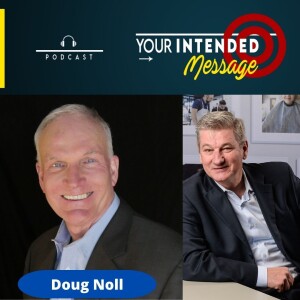
Thursday Mar 21, 2024
How to deal with angry people and calm them down: Doug Noll
Thursday Mar 21, 2024
Thursday Mar 21, 2024
You can calm that angry person in 90 seconds or less
Treat anger as a normal emotional response that you can control
Episode 199 (Doug is based in California and this is a repeat of episode 117)
Why you need to listen to this episode now.
If you ever need to face angry people and want a better way to manage the situation, listen to this conversation to save the situation and relationship.
If you ever feel out of control from your own anger, examine this perspective to maintain your dignity while deescalating the situation.
-----
George Torok and special guest, Doug Knoll - an attorney turned peacemaker - explore the nuanced world of anger and its impact on both personal and professional environments. Focusing on de-escalation strategies and the key role of active listening, this podcast sheds light on how to manage one's emotions, particularly anger, in challenging situations.
Knoll provides a unique perspective on anger, viewing it as a response to boundary violations rather than labeling it as “good” or “bad”.
His de-escalation strategies have found success in the most unlikely of places, including maximum-security prisons, attesting to their effectiveness.
The takeaways from this episode can help leaders better understand their team's emotions, promote effective conflict resolution, and ensure a healthier, more empathetic workspace.
The podcast dives deep into the concept of triggers and their role in hijacking rationality, offering effective tactics to anticipate, understand, and respond to these emotional triggers.
The importance of self-awareness and self-regulation are highlighted, along with a novel approach to redirect the frustration caused by commonly-encountered triggers.
Transitioning into the more sensitive realm of emotional invalidation, the episode examines its harmful effects in personal and professional relationships.
The discussion is geared towards parents, teachers, team leaders, and anyone looking to foster emotional safety and create deeper, healthier relationships.
The importance of emotional validation is underpinned, coupled with practical techniques to effectively validate and address emotions.
Notably, this episode not only offers intellectual paths to managing anger but also guidance for those grappling with pervasive anger issues stemming from trauma.
Prepare to be drawn into a riveting conversation about controlling anger for personal growth and professional success as you tune into this podcast.
-----
About Doug Noll
Doug Noll is a lawyer-turned-peacemaker. In addition to his law degree, he has a Masters Degree in Peacemaking and Conflict Studies. In 2000, he left a successful law practice as a civil trial lawyer to help people resolve conflicts without litigation or conflict.
Doug was born nearly blind, partially deaf, and with two clubbed feet. His disabilities were challenging to overcome….and he did
He’s a second-degree black belt and tai chi master, a certified ski instructor, an airplane and helicopter pilot, a white-water river rafter, and a jazz violinist.
Doug teaches people how to de-escalate angry people in 90 seconds or less. His fourth book, an Amazon bestseller, is called De-Escalate: How to Calm an Angry Person in 90 Seconds or Less. Doug has online video courses and provides workshops and coaching to individuals and organizations desiring to increase their emotional competency.
As a listener of Your Intended Message you are entitled to receive a free book, How to Listen Others into Existence.
Learn more Doug Noll here https://dougnoll.com/
-----
Read the rest of this entry »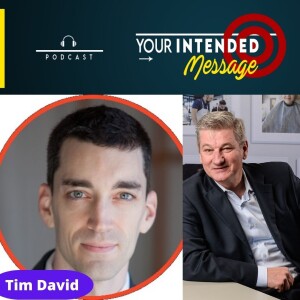
Thursday Mar 14, 2024
Seven Magic Words to Influence People: Tim David
Thursday Mar 14, 2024
Thursday Mar 14, 2024
The Magic Words to Motivate, Engage & Influence
Seven simple words to boost the power of your message
Episode 198 (Tim is based in Boston)
In this conversation with Tim David we explore:
- What we can learn from magicians about recognizing other's perspective
- Magic techniques to grab the attention of your audience
- What is it about magic that capture our imagination?
- How to connect with people
- How to leverage intended mistakes or flaws to appear more human
- How your subconscious brain reacts to these magic words
- Why you pick words that sound like their name
- The sin of being an irresponsible communicator
- The five ways to get the best results from saying thanks
About our Guest Tim David:
Tim is the author of several books, including, "Magic Words: The Science and Secrets Behind 7 Words that Motivate, Engage and Influence".
A CNN piece listed him as the 9th best motivational speaker in the world.
For 8 years, he was a professional magician touring and delivering up to 300 shows a year.
Learn more about his latest book here:
Magic Words: The Science and Secrets Behind 7 Words that Motivate, Engage and Influence
-----
Excerpts from this Conversation with Tim David:
The thing that magicians really focus on is the other person's perspective.
And if you think about it, a magician is going to practice for hours in front of a mirror so that we can see what you see, we're going to video record ourselves, we're going to hire coaches to sit in different seats of the theatre, so that we know exactly what each audience member is experiencing.
In fact, there's a phrase that magicians tell each other all the time when they're critiquing each other. And the phrase is, watch your angles.
-----
One of my speaking coaches said to me, I need you to pretend that half of your audience is blind, and half of your audience is deaf. That way you can cater your audio and you can cater your visual messages and treat each one independently.
-----
The seven words are yes, but if because, help, thanks, and a person's name, and a person's name.
-----
Read the rest of this entry »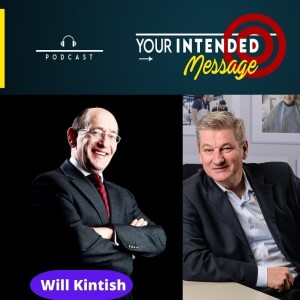
Thursday Mar 07, 2024
Boost your Face-to-face Networking: Will Kintish
Thursday Mar 07, 2024
Thursday Mar 07, 2024
Face to Face Networking is back and more important
How to get out and meet people in person
Episode 197 (Will is based in the UK)
In this conversation with Will Kintish, we explore:
- The three fears that people face when networking
- The myths and realities of face-to-face networking
- How to boost your self-confidence when attending an event
- How to go to an event with a friend for support
- Recognizing open versus closed groups
- How to introduce yourself to strangers
- Better ways to open the conversation
- How to build the relationships - the real purpose
- The importance of follow-up after the first meeting
About our guest, Will Kintish:
Will’s expertise and knowledge helps develop face-to face networking skills to ensure successful careers
The key to success in todays’ modern world is to be visible and proactive. Will gives you the tools to be able to do these.
Will is in his 60th year of work and knows his subject matter is as relevant today as it was when he started working
Learn more about his book: Business Networking: The Survival Guide
Excerpts from this conversation with Will Kintish:
People have got to know who you are, people have got to know what you do. And people need to know what is going on in the marketplace. And those are the three key reasons why we all need to be out there.
-----
if you're going to a networking event, people are there for the same reason you're there to meet other people.
-----
They're all everybody's there for the same reason. They're looking for what I call the aha moment, the light bulb moment, we are looking to going back to our friend Dale Carnegie, we are there to make friends and influence people.
Your program is called your intended message. And the message has to be you're just going to create new relationships, no selling whatever you do, don't go selling other than your personality. Simple as that.
And, for example, how do we get the show on the road? How do we get that first question out? I mean, the easiest people to join, even if you go with if you go on your own, George that person standing alone against the wall is the easiest person to approach.
You go up to them slowly, you smile at them, you look them in the eye and say "Hello there, please may I introduce myself?" I mean, what can be easier, or "Please may I join you?" Simple as that.
And then you start with that, and you introduce yourselves. Now it's at this moment, a lot of people get it wrong, right from the start. Because 90% of people admit it to me. I'm rubbish with names, I forget their name immediately.
And I say no, you don't forget their name. You didn't hear it good. You're not listening to names. When it comes to networking at relationship building is fundamental.
So if I go up to you, I am going to concentrate on the listening for your name. If you say it very, very quickly, George Torok.
And it's a noisy room and I don't hear, "Sorry, tell me again". you're never going to say to me, I've told you once, I'm not going to tell you again. You're never going people aren't ever going to say that.
But by making sure you get their name, you use their name a couple of times, and make sure it sticks. You're not going to remember everybody's name at the event.
But whilst I'm talking to you, George, I'm going to remember your name. Because what happens if my friend Mary comes over and I have to introduce you. And I've forgotten your name. That is very, very embarrassing.
And you're not going to feel good about me. Because I've forgotten your name. So I work very hard at remembering your name.
Now, maybe 20 minutes later, when I've gone off to meet other groups, I might have forgotten your name. But while you and I are in that conversation, your name is going to stick with me.
-----
Read the rest of this entry »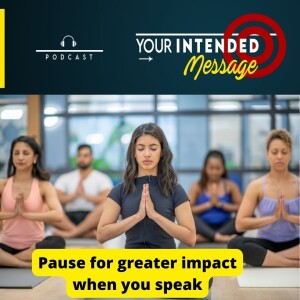
Thursday Feb 29, 2024
Pause for Power: George Torok
Thursday Feb 29, 2024
Thursday Feb 29, 2024
Use the pause to emphasize your message when speaking
Solo show featuring George Torok
Episode 196
In this show you will hear 10 reasons to make tactical use of the pause in your speaking
George Torok is known as the Speech Coach for Executives. He coaches executives to deliver more powerful and confidence presentations.
https://www.speechcoachforexecutives.com/
He trains professionals to deliver Superior Presentations.
-----
Excerpts from this episode about the pause:
Pause for Power: Why you need to become comfortable with silence!
Do you remember that cliché “Silence is Golden”?
There are times when you might appreciate some silence in your life. On the other hand, silence can feel disquieting, disturbing and anxiety ridden.
When you are speaking to an audience you might consider silence the enemy or the sign of a bad presentation.
Imagine that you get lost in your thoughts and stop speaking. You go silent and anguish while trying to recover and start speaking again.
You might even feel that any noise is preferable to silence. That’s when the umms and ahhs escape your lips.
Don’t panic. Consider the positive benefits of pauses in your presentation. Even an unplanned pause can be perceived as a positive light.
Imagine how you can improve the power of your presentation by inserting tactical pauses throughout the presentation. The ability to pause might be the most important technique that all speakers need to learn.
It might sound simple but like many simple lessons, it’s not easy.
It can be extremely difficult to pause when you are delivering a presentation. You might feel compelled to speak because you believe silence is the enemy. You perceive pausing as a sign of weakness. The reality is that silence could be your most powerful communication tool.
Perhaps you’re not convinced. That’s understandable. Consider these examples and reasons to pause during your presentation.
Let’s follow the advice from Simon Sinek and start with the why.
Listen to these 10 reasons to use the pause in your presentation.
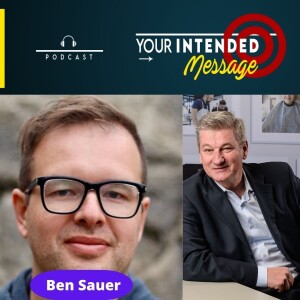
Thursday Feb 22, 2024
Design Thinking for User Experience: Ben Sauer
Thursday Feb 22, 2024
Thursday Feb 22, 2024
How can you apply Design Thinking to your presentation?
What is the total experience of your audience?
Episode 195 (Ben is based in the UK)
In this conversation with Ben Sauer, we explore:
- How might design thinking apply to presentation design and delivery?
- How to think from the audience perspective?
- Why the details mater
- How to design your presentation on the wall with post-it notes
- Why design is more about "how it works" vs "how it looks"
- What is the empathy gap that you need to recognize
About our guest Ben Sauer:
Ben is a designer who helped designers present more effectively. He's since learn how to apply design thinking to presentation development and delivery. He is the author of the book, Death by Screens, How to Present High Stakes Digital Work,
Check out his book here.
https://bensauer.net/deathbyscreens/
-----
Excerpts from this conversation with Ben Sauer:
We're coming at communication from a different angle today from the concept of how designers think and what you've learned from that process and how you've translated that into better communication.
So let's start with how do designers think and how do they communicate?
That's a great question. Well, you know, I coached designers on how to communicate. So you know, they still have some ways to go.
What I would say about that is, they really like to think in depth about how something affects the audience or the users.
And so what I would suggest that other people can learn from designers is, if you can learn a bit about how they think it can really improve how you deliver your intended message. And then there's also the process.
So how do they go about crafting a message or a piece of communication? These are all skills, you know, we tend to think of design. When most people hear the word design, they think of it in the aesthetic sense.
But that's not really how most designers think they like to think about how something works, what the experiences that somebody is receiving at the other end.
And I believe Steve Jobs, I'm paraphrasing badly, but he said something like this, you know, design people think design is the surface, but actually it's how something works. Yeah. Hmm.
-----
So designers like to go into these details about what somebody is experiencing, whether it's the thing, the screen, as well as the voice and the story, the environment to you know, this is why we have this phrase called user experience design. So what is that person experiencing?
-----
I think there's a, there's effectively an empathy gap. That's what you're talking about, right?
Which is how does somebody with an idea about what should happen ie a designer, or somebody crafting a message, actually connect with the state of mind of the person who's going to receive it or use it?
-----
Read the rest of this entry »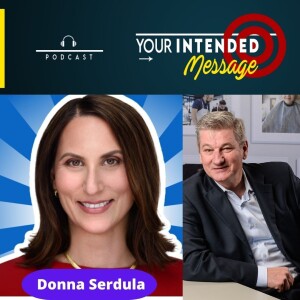
Thursday Feb 15, 2024
Your Linkedin Profile Might be Hurting You: Donna Serdula
Thursday Feb 15, 2024
Thursday Feb 15, 2024
What does your Linkedin profile say about you and your organization?
Using Linkedin to project your personal brand
Episode 194 (Donna is based in Pennsylvania)
In this conversation with Donna Serdula we explore:
- What can executive leader gain from enhancing their Linkedin Profile
- Why Linkedin is more than a job board
- Why leaders should help their employees enhance their profiles
- How to clarify the purpose of your Linkedin presence
- Is your profile current or ancient history?
- Who are you and what do you stand for?
- Why your profile must not look like a resume even if you are searching
- Why the company might help their staff look better on Linkedin
About our guest Donna Serdula:
Donna wrote a "For Dummies" book on the topic of Linkedin profiles. She started her business in 2009 and has since branded over 8,000 executives, entrepreneurs and professionals on Linkedin and beyond.
Review and upgrade your Linkedin profile by visiting
https://www.linkedin-makeover.com/order-today/
-----
Excerpts from this conversation with Donna Serdula:
The LinkedIn profile, it's not the resume. It's a digital introduction. It's a first impression, it is your manifesto.
-----
If you want to be a thought leader, if you really want to dominate the platform, you want to post more than less, but at the same time, you can truly engage with your network and get seen by posting once a week.
It's not so much the quantity as much as it's the quality.
-----
LinkedIn wants fresh profiles showing up active people, people who have something to say. So by making sure that your profile is up to date, it would be more apt to show up in the search results, versus one that hasn't been touched in six months, right.
When you think of it like that, it makes sense. Keep your profile fresh, you're going to do better in search results.
-----
How do you decide when you connect versus simply let them follow?
Oh, that's a great question because there is a difference right? connection versus a Follow Follow is one one way street. It's you saying, hey, I want to subscribe to that person's updates.
Whereas when you connect, it's saying, Hey, I know this person, I like I trust this person. And not only am I subscribing to them, but they're going to subscribe to me, and they're going to be in my network, they're grew to become first degree connections, and all of their connections are going to become second degree connections, and all of those connections, connections are going to become third degree connections.
So it really does extend your reach when you connect, when that's a good thing.
-----
Read the rest of this entry »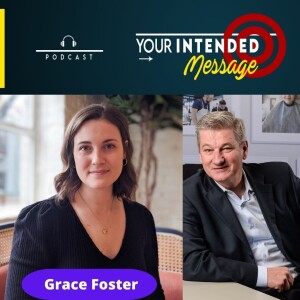
Thursday Feb 08, 2024
Don't send that email yet: Grace Foster
Thursday Feb 08, 2024
Thursday Feb 08, 2024
How to write smarter emails
Writing is a learned skill
Episode 193 (Grace is based in Washington DC)
In this conversation with Grace Foster we explore:
- Why we need to learn how to write smarter emails
- The danger of emotional writing
- Checking your writing for tone
- Consider the New York Times test
- Recognizing our negative bias
- Why you don't want to "bury the lead"
- How to kick start the writing process
- Recognizing the difference between the terrible drafts and final edit
About our guest:
Grace Aldridge Foster is co-founder of Bold Type, a WBENC certified 100% women owned company that trains people how to write more effectively in the workplace.
Learn more about her company and services here
Get the free guide to remove clutter from your writing
https://www.boldtype.us/clutterbust
-----
Excerpts from this conversation with Grace Foster:
Your writing speaks for you when you're not in the room. So you have to work harder to make sure that that your message is being received the way you intended it, because you aren't there to walk it back or to course correct.
-----
George, where do I start? I'll first say that I have a lot of sympathy for people writing emails, because we're all expected to do it. We write emails all day, every day, they are the cornerstone of workplace communication.
And yet no one actually has been taught how to write good emails, what happens is we just get into the workplace, and we start observing how other people do it. And we start emulating them.
Well, what happens if everyone who's already there is already writing terrible emails, you never sort of had a chance, right? So I just want to say there are a lot of people out there who are very smart, and actually very good writers, but who still write terrible emails.
And mostly it's because they've never been taught to do better. Things that I noticed are, of course, terrible subject lines, mostly people actually include subject lines these days, thankfully, gone are the days of kind of empty subject lines, because their spam filters, you know, latch on to those completely.
But a lot of times, folks are just way too vague in their subject lines. And I think one of the reasons for that is people forget one of the primary purposes of sending an email versus something else picking up the phone and calling for example, is that you have a record, your inbox is an archive, you can search your inbox looking for a particular conversation or message from someone.
But when you have a very vague subject line, it gets much more difficult to search for a particular email or particular conversation that you had previously. So it's not just that they're vague, which is a problem the first time you receive them that it becomes a problem also, if you want to find that email again later.
So that is certainly a common problem that I see. There. Also, too long. Emails are too long. They are too wordy. They're either too formal or not formal enough, right. The level of formality often doesn't fit the audience and the purpose of a particular message.
And something that we may talk about is that the frustration that I hear over and over from managers who engage in bold type to do email training is why don't my employees just know how to do it right. It's a judgement call.
All it's a judgement issue, you know, why don't they just understand why don't they just get that that email of a sent wasn't right. But that's a difficult thing to learn, it takes time.
-----
You should email like, your messages might end up on the front page of The New York Times because it's happened.
-----
Read the rest of this entry »
